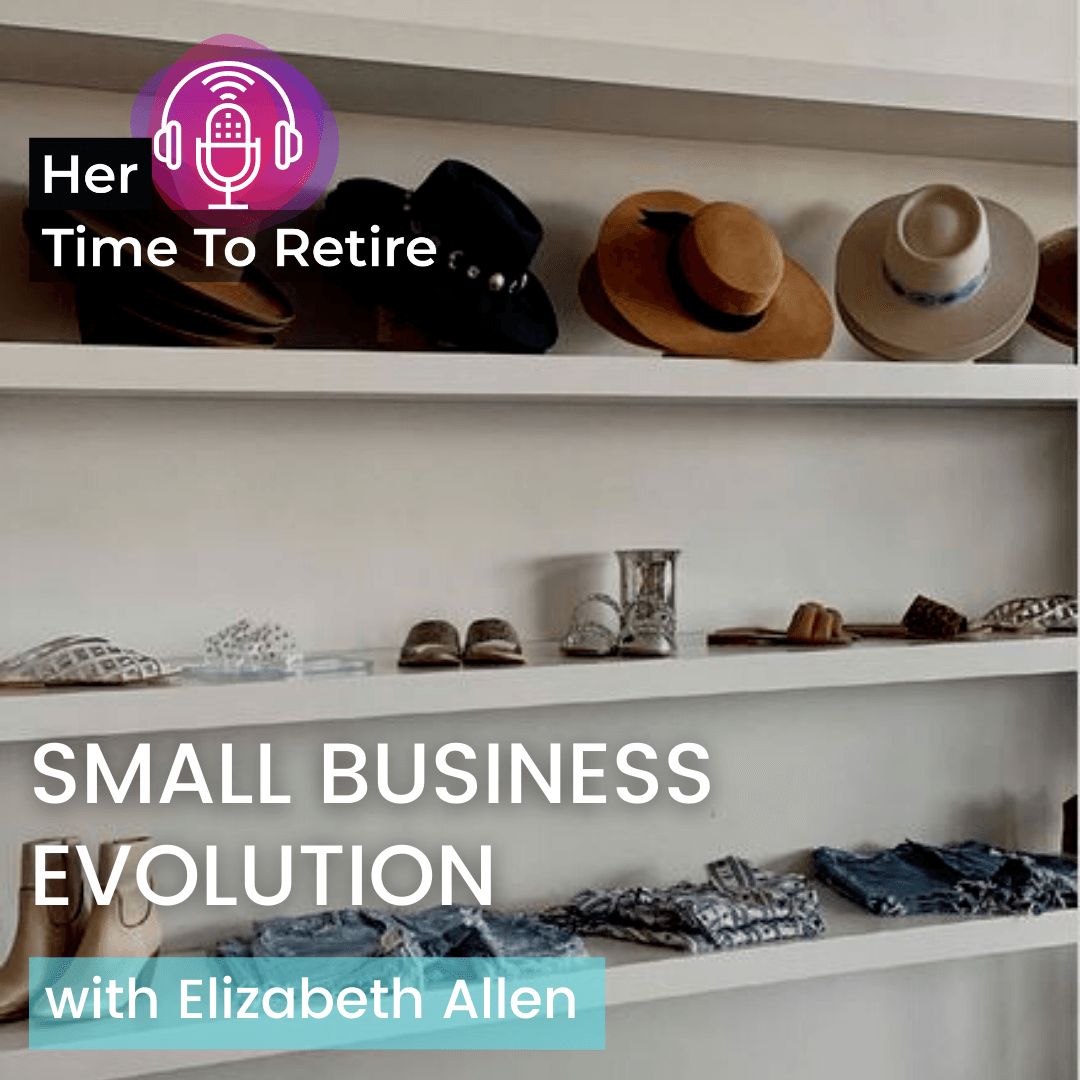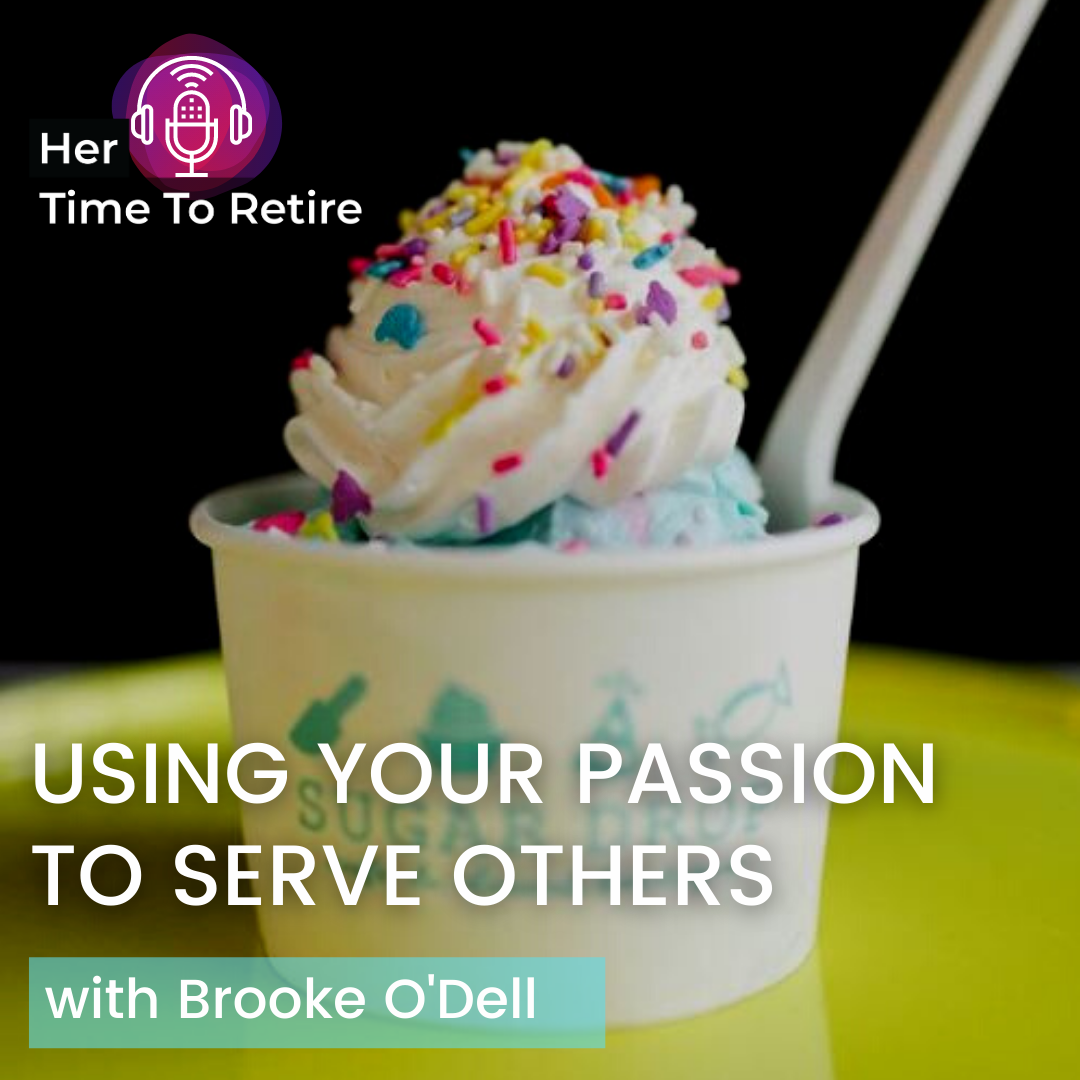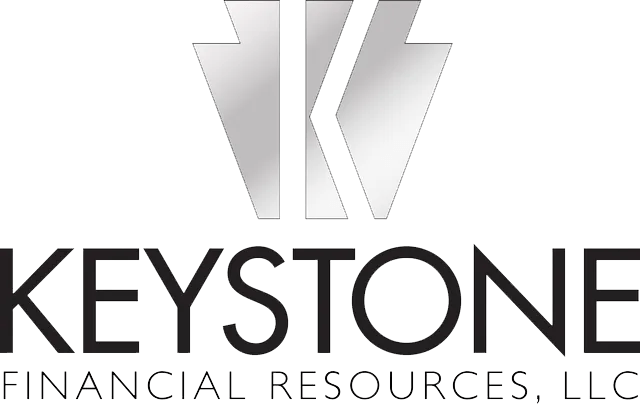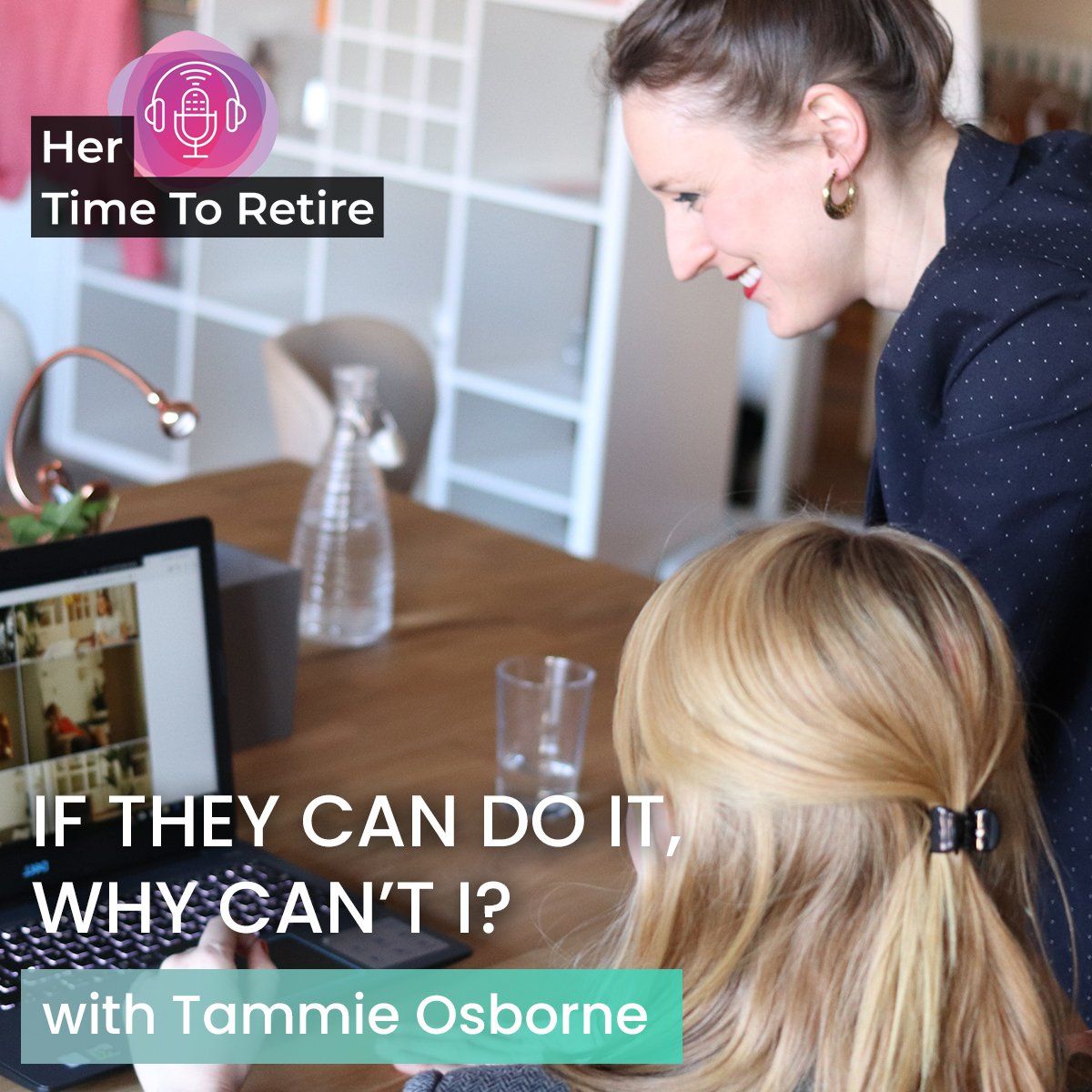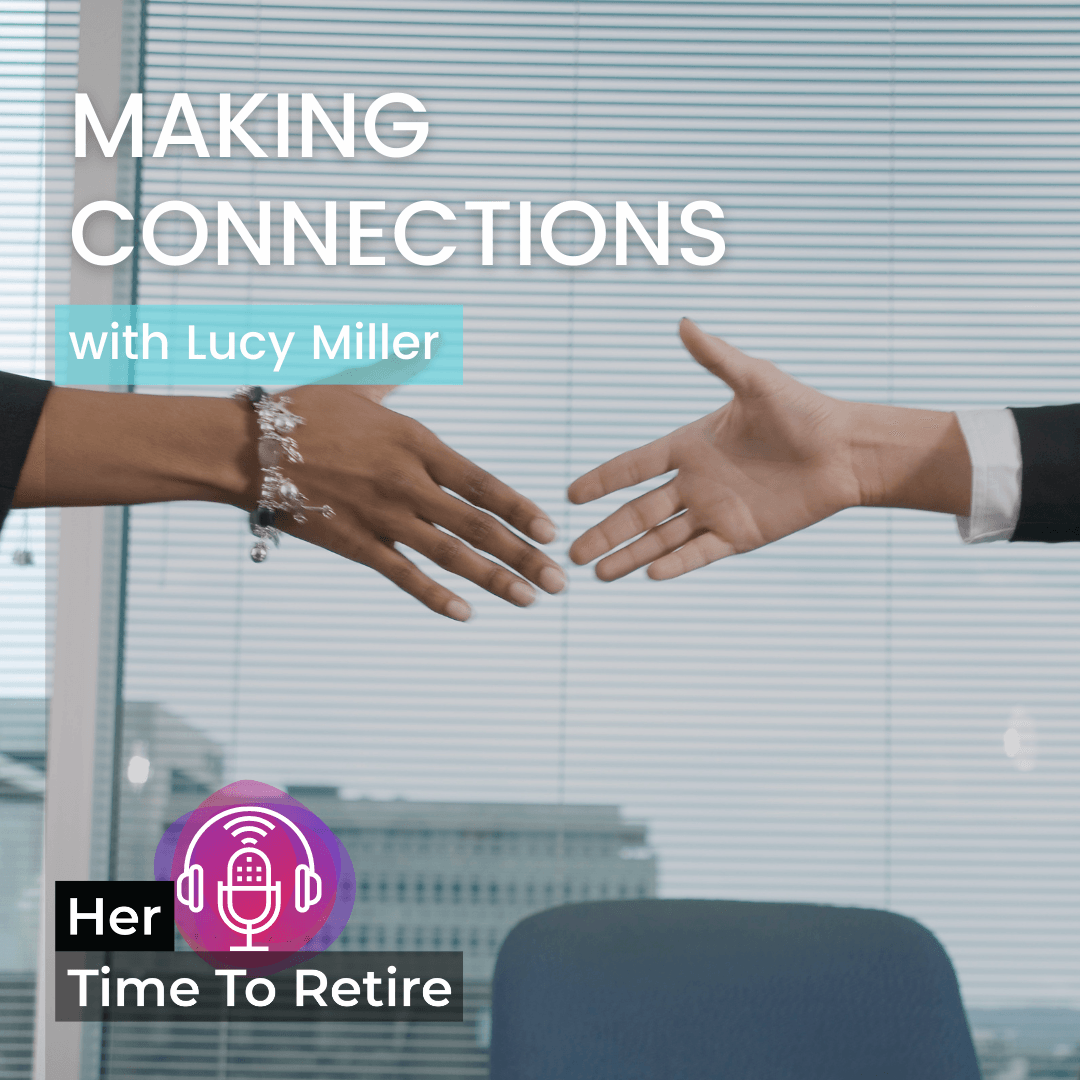Jonathan Scott: [00:00:00]
Okay, so welcome to Her Time To Retire. I'm Jonathan Scott, your host today. And I am a co-owner and advisor at Keystone Financial Resources. And this podcast was created so that we can speak with women who are at the top of their industry and create a place where they can share their best ideas and advice with you, our listeners.
Our guest today has some incredible wisdom to share with us on today's episode. Today, I'm talking with Sherry Deutschmann, founder and CEO at BrainTrust. And Sherry is a serial entrepreneur. She's an author, and a passionate advocate of entrepreneurship. In 2019, Sherry founded BrainTrust, a company dedicated to helping women entrepreneurs grow their businesses. Now, prior to founding BrainTrust, Sherry was founder and CEO of LetterLogic Inc. This is a company that she grew to $40 million and sold it in 2016.
Now, LetterLogic was named as an Inc 5000 company, which is one of the 5000 fastest growing, privately held businesses in the US for consecutive 10 years. Now, Sherry attributes the success of LetterLogic to its unique culture, in which the needs of the employees come before those of the customer or the shareholder. And that culture led Sherry and LetterLogic to be featured in The New York Times, Forbes Magazine, Business Leaders, Inc, and Fast Company. Sherry was honored by President Barack Obama as a White House Champion of Change in 2016. And Sherry's book, ‘Lunch with Lucy: Maximize Profits by Investing in Your People’, was released in March of 2020, and it received national honors, winning both the 2021 Gold Forward Indies Business Book Award, and the 2021 Bronx Axiom Business Award. Is that right, Sherry?
Sherry Deutschmann: [00:01:57]
It is.
Jonathan Scott: [00:01:58]
Alright, very accomplished. So, welcome. I'm glad to have you today. And...
Sherry Deutschmann: [00:02:04]
In reading that bio, you've said everything there is to know about me. So, I can leave now.
Jonathan Scott: [00:02:10]
It feels like it, doesn't it? Well, there's a lot to say about you. And there's a whole lot more I want to get into. Tell us a little bit about you as a person. We're going to get into BrainTrust today, but I really wanted to just find out and let our listeners find out a little bit about where this all started for you. Tell us a little bit about your story.
Sherry Deutschmann: [00:02:33]
It started in the mountains of North Carolina. I grew up in a town called Banner Elk, which is a ski resort town.
Jonathan Scott: [00:02:39]
Very familiar with Banner Elk. Mm-hmm.
Sherry Deutschmann: [00:02:41]
And I left there in my early 20s. I was newly divorced, a young mother, I had a 2-year-old daughter, and decided that I was going to move to Nashville to be a star. Thought I was a singer.
Jonathan Scott: [00:02:53]
Okay.
Sherry Deutschmann: [00:02:55]
And I'm a pretty mediocre singer. And I had no other skills or knowledge or anything. I had only a high school diploma. The only skill I had was in toilet scrubbing. I had a route where I cleaned gas station bathrooms.
Jonathan Scott: [00:03:12]
It was rough job.
Sherry Deutschmann: [00:03:13]
Very glamorous.
Jonathan Scott: [00:03:14]
Yeah, yeah.
Sherry Deutschmann: [00:03:16]
And I was a receptionist for my dad's plumbing company. And that's how I made a living. And so, I was kind of... not kind of, I was very naive thinking I was going to come here and get a record deal. And had very little to fall back on. So, I ended up selling cars.
Jonathan Scott: [00:03:36]
Okay.
Sherry Deutschmann: [00:03:37]
I worked at Beaman Lincoln Mercury because you could get a job selling cars without a degree, or without any education of any kind really, and without any formal training. So, I started a career there in sales. I was raised as a Jehovah's Witness.
Jonathan Scott: [00:03:554]
Okay.
Sherry Deutschmann: [00:03:55]
So, that Jehovah's Witness background turned out to be a pretty good training ground for sales.
Jonathan Scott: [00:04:01]
Okay.
Sherry Deutschmann: [00:04:02]
So, you learn how to call on everybody, knock on every door, and handle rejection. And so, that background really served me well on sales. And the end of the first couple of years in Nashville were very rough. I didn't have enough money often to pay the light bill and daycare. So, my daughter and I learned how to take cold showers in the dark, and just had a cooler where we kept the basic needs that had to be refrigerated, and just struggled through life for a couple of years. Until I kind of hit my stride in sales and started getting out of that kind of impoverished period of my life.
Jonathan Scott: [00:04:48]
Right. So, I bet you were great at sales.
Sherry Deutschmann: [00:04:52]
I think I'm decent.
Jonathan Scott: [00:04:53]
Okay.
Sherry Deutschmann: [00:04:54]
I've seen much better.
Jonathan Scott: [00:04:56]
So, how long do you say that you spent selling cars there? And what was the transition?
Sherry Deutschmann: [00:05:02]
I was only there a year, because I did what a lot of women do, which is foolish, started dating my boss.
Jonathan Scott: [00:05:09]
Oh wow. Okay.
Sherry Deutschmann: [00:05:10]
And then became obvious one of us had to leave, and that was me. But I'm grateful for that time selling cars. The car industry is rough. Lots of very long hours. So, that was really hard for me as a single mom. And not steady income. I would do really great one month and sell a lot of cars, and then a couple of months, not sell much.
Jonathan Scott: [00:05:33]
How did that lead you on to LetterLogic?
Sherry Deutschmann: [00:05:36]
I'd started, when I left the car business, I just started working for my waste management first in medical waste cells. And that just led me to a career of medical sales. And I went to work for a company here, and actually here, just a block away from here, National Business Products. And they had Steven Prince was my boss. And he had the idea that he could get hospitals to send their data to us electronically, and then we would print and mail the hospital bills. And so, he owned a traditional printing company, printing letterhead, business cards, and things like that. But he had decided that he could get hospitals to do that. And that's what he hired me to do, to go to hospitals and say, “Send us that data. Let us do your printing and mailing of your bills.” And it was right at the very beginning of hospitals beginning to even think about outsourcing that. So, it took me maybe 6 months to get my first client, and then after that, we just grew so quickly. And so, I went from making so little money, I couldn't keep the lights on, to making 6 figures very quickly.
Jonathan Scott: [00:06:51]
Wow.
Sherry Deutschmann: [00:06:52]
And I bought my first nice car and bought a house. And by that time, I’d owned a couple of houses, but that company was acquired. And with the acquisition, I was Vice President of Sales for that company. And in general, we were just not very good. I would sell a new account and lose an account the same day because our customer service was so bad. So, I had no trouble selling the accounts, but keeping them was the problem.
Jonathan Scott: [00:07:25]
I see. I think that's a challenge for a lot of business owners.
Sherry Deutschmann: [00:07:27]
Yeah.
Jonathan Scott: [00:07:28]
You talk about consistent flow going in the top of the bucket, but how do you seal up the hole in the bottom of the bucket?
Sherry Deutschmann: [00:07:38]
So, I was really dedicated employee. I felt like I was an ideal employee. I was mostly paid on commission. But on nights and weekends, I'm the one who cleaned the bathrooms when they needed. Tile laid in the IT department, I'm the one who laid it. I was there on the weekends cleaning the lawn and pulling weeds.
Jonathan Scott: [00:07:59]
You took ownership?
Sherry Deutschmann: [00:08:00]
I took ownership. And when we started having so many customer service problems, I set out to figure out why. Most of the problems were simple human error, and that was really easy to see. Which led me to see that my co-workers didn't care as much as I cared, otherwise, they wouldn't have been so careless. And then I had an epiphany that the reason they don't care is because nobody here cares about them. And they knew it and they felt it.
And I had just read the book called ‘Nuts’. And it's a story about how Herb Kelleher started Southwest Airlines with his belief that, if he took great care of the pilots and the flight attendants and the baggage carriers, that they would take great care of the passengers and it would all work out. And it has.
Jonathan Scott: [00:08:53]
It did. It's a great model.
Sherry Deutschmann: [00:08:55]
Yeah, right?
Jonathan Scott: [00:08:56]
Sure.
Sherry Deutschmann: [00:08:56]
So, that was like ding, ding, ding, ding, ding to me. I ran to my boss, and said, “I've got an idea for how we can stop the bleeding here, that if we just take better care of the employees, they will take better care of the customer.” And instead of being grateful to me that I was concerned about his company, my boss patted me on the hand and said, “Sherry, you don't know anything about business. Why don't you just go sell something?”
Jonathan Scott: [00:09:29]
Wonder how he feels today.
Sherry Deutschmann: [00:09:30]
Well, I've talked to him many times since then. But that was just so demoralizing, and frustrating. And so, I did what a lot of people thought was foolish because I was making 6 figures, I just quit. And I decided that I could do what he was doing better.
Jonathan Scott: [00:09:52]
That’s the American dream.
Sherry Deutschmann: [00:09:53]
It is.
Jonathan Scott: [00:09:54]
And you weren't afraid because you had been there before.
Sherry Deutschmann: [00:09:56]
Yeah. Oh, I could go back to scrubbing toilets anytime.
Jonathan Scott: [00:09:59]
That’s right. That’s right.
Sherry Deutschmann: [00:10:01]
So, I went to several different people in town and said, “I need about $350,000 to start this company competing with that guy.” And all... this is amazing, all 5 of them said yes. That is not part of the typical entrepreneurial journey. Usually, it's really hard for people to get funding, especially women, which is another whole story. We only get 2% of the venture capital in this country, which is crazy.
So, I looked at other offers, and none of them were going to give me the latitude to run the company the way I wanted to run the company. So, I just said no to everybody. And I had a week-long yard sale, sold all my belongings. By that time, I was flipping houses, so I sold the houses that I had, cashed in my 401(k), and got up enough money, not $350,000. But I got enough money to get started. And so, right there in my basement, right next to the washer and dryer, I had sold everything, so I just had to go to the goodwill and buy 2 little, short filing cabinets. And that became the base for my desk. And there was an old door that I pulled over the file cabinets that became my desk. And I had a whiteboard and a landline. And the company that I had just left gave me an old computer. And that's where I started.
Jonathan Scott: [00:11:26]
what year was that?
Sherry Deutschmann: [00:11:27]
That was 2002.
Jonathan Scott: [00:11:29]
That's amazing. And an amazing time, was just right after the dot-com bubble.
Sherry Deutschmann: [00:11:34]
Right? So, actually, I left them in October of 2001, and then incorporated in January of 2002. And knew that I could be just like them. I knew I could sell the service, but I knew that I could also implode if I followed their path. And so, my business model from day 1 was to be all about the employees. And I just really took to heart what I read in that book. And I'm going to take such good care of these people that when they're at work, they're not wondering whether or not the lights are going to be on when they get home. I'm going to pay him enough that they're not worried about that. And I'm going to take care of all of their other needs, so when they're here, they're totally focused just on the customer. And if I do that, my customers will be loyal, and they'll be willing to pay at premium. So, day 1 I had... we paid for 100% of the employee's medical, dental, disability, and life insurance. We paid a fair living wage, which I could talk about for an hour what that means, and what constitutes a fair living wage. We...
Jonathan Scott: [00:13:00]
Assuming that the fair living wage was above normal, above average.
Sherry Deutschmann: [00:13:05]
Oh, absolutely. And then we helped them start their own companies if they were entrepreneurial. We gave them gifts for the down payment of their first homes. So, we had a first-time homebuyer's program. And then in the best business idea I've ever had in my entire life, I had a very unique profit-sharing plan that changed everything. And you know how most companies that have profit sharing plans, they pay out the profit annually? They might do it in stock or stock options. They might do it in cash, but it's annually. It's after the books close. It's not really related to any person's individual behavior, or outcomes. It’s just in general.
But I wanted every employee to care as deeply about the company's idea. So, every month, I brought all the employees together in one room. And first, it was a room this size. And then as we grew, it was a much larger space. And we had lunch catered in, and then we went over the financials from the previous month. I shared with them the P&L, so they could see to the penny, how much money we brought in. And they could see all our expenses. And we could talk about the expenses. Took the bottom line, and took 10% of the bottom line, no matter what it was, and gave it to them with physical checks right there on the spot, with the key to that being that everybody got exactly the same dollar amount. Which means our CFO got exactly the same thing our janitor got.
Jonathan Scott: [00:14:51]
Wow.
Sherry Deutschmann: [00:14:52]
Because the CFO was already paid for their skills and knowledge because they had a much higher salary than did our janitor. But they equally contribute to the end product.
Jonathan Scott: [00:15:04]
Right.
Sherry Deutschmann: [00:15:05]
And so, everybody got exactly the same dollar amount. And there was a real connection for the employees between their actions and that bottom line. So, in months where we had a very profitable month, we could get together at that monthly meeting and celebrate it and talk about how we were rolling like a Timex.
Jonathan Scott: [00:15:31]
Right, right.
Sherry Deutschmann: [00:15:31]
A Rolex, not a Timex.
Jonathan Scott: [00:15:33]
Right.
Sherry Deutschmann: [00:15:33]
And everything... everybody did exactly what they were supposed to do when they were supposed to do it and, “Look at the results,” and, “Here's your checks.”
Jonathan Scott: [00:15:43]
Right.
Sherry Deutschmann: [00:15:44]
And then when things weren't so well, because we had a major screw up, then we didn't point to the person who started it, because all of us were part of the mistake.
Jonathan Scott: [00:15:54]
Right.
Sherry Deutschmann: [00:15:54]
Because there were so many ways we could catch it along the way.
We just talked about it, and let's make sure that never happens again. And because of that, the profit share is not as much this month. So, the first profit share check was about $7. And you would think that's not going to motivate anybody. It did.
Jonathan Scott: [00:16:15]
Sure.
Sherry Deutschmann: [00:16:16]
It was still like, “I am part of something bigger.”
And then that grew to $70, and then $700. And this is every month. So, if you've got people that are making 20, $25 an hour, and then every month, you're getting a check for 500, or 700, or $1,000...
Jonathan Scott: [00:16:34]
It's a big deal.
Sherry Deutschmann: [00:16:36]
It was a big deal. And it is why we had very little turnover, why we had the cream of the crop wanting to come to workforce. And there was a really unusual byproduct that I did not expect. So, maybe 5 or 6 years into that, I was with the sales team presenting to a big healthcare system. So, our clients were the big healthcare systems of our nation. So, Bonsa Corp and the Virginia's, to Dignity Health in California, Stanford University Medical Center in Northern California, those were our clients.
And in one of those meetings, I just told the customer, the prospective customer, sitting with him and a bunch of decision makers around a table like this, and I just said, “I want you to know, Jonathan, that I want your business. I do want your signature on that page today. But I don't believe the customer comes first.” And there was a long silence.
Jonathan Scott: [00:17:47]
Mm-hmm. I bet.
Sherry Deutschmann: [00:17:48]
And people looking at each other like, “Did she just say what I thought she said?” And my salespeople squirming like, “Oh, no, she didn't say that.” And then their reaction was priceless. They got it. And then the salespeople, instead of being embarrassed about me, started saying, “Hey, can you come with us and do that thing you do?” Because they didn't quite have the guts to do it.
Jonathan Scott: [00:18:15]
To do it, right.
Sherry Deutschmann: [00:18:16]
And the sales team said that 85% of the closes they made were what they called culture sales, that that's why people were choosing us. In fact, we had one of those clients, which is big, very prestigious healthcare system write us a letter to say, “You were 10%, higher than the next highest bid. And yet, we still chose you because we could see how the culture of your company would affect us.” And it is why the company did so well.
Jonathan Scott: [00:18:51]
Wow.
Sherry Deutschmann: [00:18:52]
So everything from letting the employees bring their kids and pets to work, to helping them buy a house, to treating every employee like they mattered, and having at the heart of all that, the guiding principle for the whole company was empathy, truly listening and caring about each individual and their individual circumstances. And they knew they were cared for.
Jonathan Scott: [00:19:23]
For sure.
Sherry Deutschmann: [00:19:24]
And so, they gave it their all.
Jonathan Scott: [00:19:25]
And it would be hard to see how that would not work. I mean, how would someone not have ownership in the company?
Sherry Deutschmann: [00:19:34]
That's why it baffles me that more companies don't follow that philosophy, because it's really, really plain to see.
Jonathan Scott: [00:19:44]
And you sold that company in 2016.
Sherry Deutschmann: [00:19:46]
Yes.
Jonathan Scott: [00:19:47]
And that went on to BrainTrust, correct?
Sherry Deutschmann: [00:19:51]
Yes.
Jonathan Scott: [00:19:52]
So, tell me a little bit about BrainTrust.
Sherry Deutschmann: [00:19:54]
Well, through the years that I was growing, LetterLogic, I was part of 2 different organizations that were pivotal to my success, I believe. And 1 was EO, which is the Entrepreneurs Organization. And the other was WPO, which is the Women's President's Organization. They work similarly in that they put entrepreneurs together in small groups for pure learning. And that was really valuable to me. And I wanted to give more women the opportunity to experience that. But you can't join either of those organizations until you get to a million in annual revenue.
Well, the problem is that only 2% of women ever get there. Only 7% of men ever get there. And so, here's this massive market. In the US, it's 13 million women business owners who don't achieve a million in annual revenue. So, I created this peer-to-peer learning for them, for those 13 million women to be part of a peer group of people who can hold them accountable, and who can share their lived experiences in a way that helps them overcome hurdles, and vet opportunities better, so they make better choices and decisions. And wow, it's working.
Jonathan Scott: [00:21:22]
It is working. There's some commonalities here. So, ladies, if you're listening today, there are some things that progressed for Sherry. I want to dig in and kind of flush some of these commonalities out. What point did you decide that you knew who you were? Was it when you were leaving the car sales business? Was it when your boss reached out and patted your hand and said, “You don't know anything about business,”? At what point did you discover who you really were, and become confident in that?
Sherry Deutschmann: [00:21:59]
I think I was 12. And I tell the story in my book, which, if I tell it on the air, I’ll cry, so I don't tell it, try not to, but where I spoke up to my dad who was kind of a dictator, and not very kind to my mother. And I stood up to him at 12, no longer able to take how he treated her. And it shifted my relationship with him permanently. And from that point on, I realized that my power to speak truth and to be direct and honest with people was a superpower, and that I had to use that power.
And so, it's through the years, I had to stand up for myself, but then became an advocate for people who couldn't speak up for themselves. And so, when it came to standing up to a boss who didn't appreciate me, or standing up to clients, so I regularly fired clients that were not a good fit, until I learned not to bring them on to begin with.
Jonathan Scott: [00:23:15]
To begin with. It's a hard lesson, ladies.
Sherry Deutschmann: [00:23:20]
It is, isn't it?
Jonathan Scott: [00:23:21]
I hope you got that. Don't bring people on in the first place that are not a good fit
Sherry Deutschmann: [00:23:26]
Some of the most powerful moments that I have had in my career was saying no to prospective clients and saying no to clients. And you think that is going to hurt the relationship, it does just the opposite. It creates so much trust when you can say no to a customer and have conviction that you're doing the right thing.
Jonathan Scott: [00:23:50]
That’s right.
Sherry Deutschmann: [00:23:51]
So, I think that really started at 12. And it was a terrifying moment for me, but a pivotal moment in my life. And when my father passed away in 2016, he died before I sold the company, so he didn't... I mean, he knew the company was really successful, and I was doing well. But as he was in his last days, he told me that I was his best friend, and I was the one person he felt like he could be honest with.
Jonathan Scott: [00:24:20]
What a gift.
Sherry Deutschmann: [00:24:21]
It was a gift.
Jonathan Scott: [00:24:22]
What a gift.
Sherry Deutschmann: [00:24:23]
And it was because I was honest with him.
Jonathan Scott: [00:24:25]
Starting at 12. And so, I relate to that so much. I've told you before we started that that's my mother out front. And my mom's been a hero to me ever since I was very little. But I remember the first time I got a sense of who I was, and it was a part of our story. But when I was 5 years old, my mother and father went through a very atypical divorce. And I tell people it was more of an abandonment. And so, I went from living a very nice lifestyle, we lived in a nice house in Roswell, Georgia. My father was a part of aviation industry and doing very, very well. I remember he drove a Corvette. Mom drove a Cadillac. And in one year's period of time, we were living in a completely different town. We were completely on our own. I remember when I thought we were getting robbed, and it was actually the repo man coming and taking my mother's car away, because my father hadn't paid the bill on it.
And so, very early on, I went through a huge transition. And I remember seeing my mother anguished through that time, and I remember seeing her security just wash away almost all at one time. And she went from having a very secure life and one that she felt like she knew what the outcomes were going to be in the future, to suddenly having that all dissolved and having to become the primary breadwinner. And so, at 6 or 7 years old, I remember very clearly thinking to myself, “As soon as I'm big enough, as soon as I'm able to, I'm going to make sure she doesn't have to feel that way ever again.” And there's goods and bads to feeling that.
Sherry Deutschmann: [00:26:23]
Yeah.
Jonathan Scott: [00:26:24]
And there's things that you have to come through and realize you can't protect and change everything, and you're not responsible for everything. But by the same token, it gave me a very good sense of what I could accomplish and what I could be driven to do. And the boldness that you talk about is a characteristic that I know that entrepreneurs, by and large, have to experience. So, they have to have come-of-age time. They have to become bold to be successful. You have to have a good sense of who you are, know exactly who you are, why you're here, what you're doing, and be bold enough to state it to other people, and not worry about what the outcome is. It is who you are. It is what you believe very clearly. And you're able to state it. And that's really a neat place to get to.
So, once you got to that place and you began to see this success in this model, and you began to see that it was scalable and you could teach other ladies with it, tell me a little bit about what you get out of that past just the money. I talked to people all the time, and for me in this business, I absolutely love clients that come in and say, “I need some help. I need some help,” not just, “I want to do better here,” or, “Help me maximize this.” I really love hearing the words that, “I need some help,” and then being able to document where we were right then at that moment, and then look back in a few months' time or a year's period of time, and look at all the changes together and have that victory moment of saying, “This was life changing.” I know that 100% I helped change this person's life for the better, and maybe the generations past that.
And that fuels me so much more than just the dollar. Because I can make plenty of dollars in investing on my own. This is what I get out of helping people. For you, what is that?
Sherry Deutschmann: [00:28:35]
It's about seeing women reach financial independence. And for a lot of women too in generational poverty, it is deeply satisfying. And this new company, BrainTrust, is a for-profit entity. I didn't think I could model for women how to create a scalable, profitable business if I did it as a nonprofit.
Jonathan Scott: [00:29:01]
Right.
Sherry Deutschmann: [00:29:01]
But we're a long way from profitability. We might begin cash flowing at the end of this year.
Jonathan Scott: [00:29:06]
Okay.
Sherry Deutschmann: [00:29:07]
And so, it is a labor of love to spend my time helping them make critical connections and funding. So, I've personally invested in 23 women on businesses, but really, more critically connecting them to the right engineers, or the right CFO, or the right investor for them so that they can turn that business into whatever it can be. And it’s about money, but it's also about the megaphone that successful entrepreneurs get. So, the idea that I would be invited to the White House, that I would address Congress, that is ridiculous. But I got there because I had a successful business...
Jonathan Scott: [00:30:02]
That’s right.
Sherry Deutschmann: [00:30:02]
That did things a little differently. And so, I want more women to have... to experience that, the power and the influence that you get through a successful business and doing it your way. And, man, I see it happening. With, in general, as I said, less than 2% of women get to a million, but in our first 24 months, more than 10% of our members made it.
Jonathan Scott: [00:30:27]
Oh, that's fantastic.
Sherry Deutschmann: [00:30:29]
So, we've had to create another whole product for women over a million because they did not want to leave to go to this other organizations. They wanted to stay with these women. So, now we have the Key Club for women over a million. And several of them are heading to 10 million and well beyond.
Jonathan Scott: [00:30:49]
That is o fantastic. Well, Sherry, I can see how you're the catalyst for that, and also just a wonderful resource for so many ladies. So, Sherry, for our listeners out there, tell them how they might get in touch with you.
Sherry Deutschmann: [00:31:05]
Well, you can check out our website at our, o u r, ourbraintrust.org, or email me directly at sherryd (that's s h e r r y d) @ourbraintrust.org.
Jonathan Scott: [00:31:21]
So, I hope that our listeners will be able to reach out to Sherry for ideas or services and things. Sherry Deutschmann, she is the founder and CEO of BrainTrust. And we have enjoyed having you today, for certain.
Sherry Deutschmann: [00:31:36]
Thank you. It was a joy to be with you.
Jonathan Scott: [00:31:39]
Good, good. And I tell you, if any of you have any questions out there listening today, you can always call in. You can reach out to us at keystonefinancialresources.com. But we'll look forward to each of you having something good to hear for next time.
Outro:
You have been listening to Her Time To Retire with Glenn Price and Jonathan Scott. Glenn and Jonathan would love to talk to you and answer any of your retirement questions. All listeners can take advantage of a free 15 minute consultation with Glen and Jonathan, whether via phone calls, Zoom meeting, or in person. You can schedule your consultation by calling 615-661-9554, or by visiting our website at www.keystonefinancialresources.com. Thanks for listening.
The opinions expressed by Keystone Financial Resources and guests on this podcast are their own and do not reflect the opinions of this station. All statements and opinions expressed are based upon information considered reliable, although it should not be relied upon as such. Any statements or opinions are subject to change without notice. Investments involve risk, and unless otherwise stated, are not guaranteed. Past performance cannot be used as an indicator to determine future results. Strategies mentioned may not be suitable for everyone. Information expressed does not take into account your specific situation or objectives and is not intended as recommendations appropriate for you.
Before acting on any information mentioned, please consult with a qualified tax or investment advisor to determine if it is suitable for your specific situation. This program is designed to provide accurate and authoritative information with regard to subject covered. Investment advisory service is offered through Brookstone Capital Management LLC or BCM, a registered investment advisor. BCM and Keystone Financial Resources are independent of each other. Insurance products and services are not offered through BCM, but are offered and sold through individually licensed and appointed agents.
